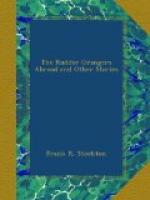A portion of the river, far southward, called “The Narrows,” presented a very peculiar scene. The banks were scarcely fifty feet apart, and yet there were no banks. The river was shut in to the right by the inland shore, and to the left by a far-reaching island, and yet there was no inland shore, nor any island to the left. On either side were great forests of mangrove trees, standing tiptoe on their myriad down-dropping roots, each root midleg in the water. As far as we could see among the trees, there was no sign of ground of any kind—nothing but a grotesque network of roots, on which the forest stood. In this green-bordered avenue of water, which extended nine or ten miles, the thick foliage shut out the breeze, and our boatman was obliged to go ahead in his little boat and tow us along.
“There are Indians out West,” said Euphemia, as she sat gazing into the mangroves, “who live on roots, but I don’t believe they could live on these. The pappooses would certainly fall through.”
At Jupiter Inlet, about a hundred and fifty miles from our point of starting, we went into camp, in which delightful condition we proposed to remain for a week or more. There was no trouble whatever in finding a suitable place for a camp. The spot selected was a point of land swept by cool breezes, with a palmetto forest in the rear of it. On two sides of the point stretched the clear waters of the river, while half a mile to the east was Jupiter Inlet, on each side of which rolled and tumbled the surf of the Atlantic. About a mile away was Jupiter Light-house, the only human habitation within twenty miles. We built a palmetto hut for a kitchen; we set up the tents in a permanent way; we constructed a little pier for the yacht; we built a wash-stand, a table, and a bench. And then, considering that we had actually gone into camp, we got out our fishing-lines.
Fishing was to be the great work here. Near the Inlet, through which the waters of the ocean poured into and out of our river, on a long, sandy beach, we stood in line, two or three hours every day except Sunday, and fished. Such fishing we had never imagined!—there were so many fishes, and they were so big. The Paying Teller had never fished in his life before he came to Florida. He had tried at St. Augustine, with but little success. “If the sport had been to chuck fish into the river,” he had said, “that would be more in my line of business; but getting them out of it did not seem to suit me.” But here it was quite a different thing. It was a positive delight to him, he said, to be obliged so often to pay out his line.




